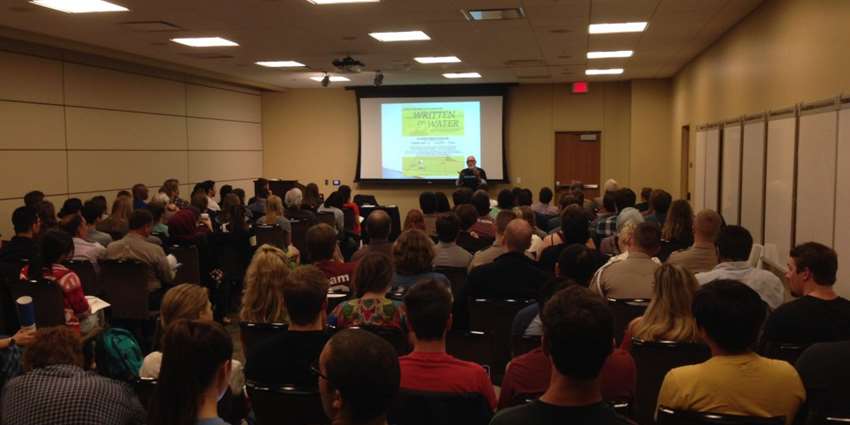National expert on groundwater and sustainable water management Dr. Michael Campana championed the importance of integrated water resources management (IWRM) to the nation’s water supply, stressing that successful IWRM is “a process, not a prescription” during his keynote lecture at the March 29 Water Daze event at Texas A&M University.
“In my opinion, Nebraska does the best job at IWRM on a statewide basis,” said Campana, a professor at Oregon State University and technical director of the American Water Resources Association. He also gave examples of successful IWRM implementation in Florida, New York City and Singapore.
Campana said that according to the Global Water Partnership IWRM is a process that promotes the coordinated development and management of water, land and related resources in order to maximize economic and social welfare in an equitable manner without compromising the sustainability of vital ecosystems and the environment. Watersheds are usually the management units used within IWRM, he said.
Texas’ various water management and planning systems, including groundwater conservation districts, groundwater management areas and regional water planning groups, result in a legal structure that makes conjunctive management of groundwater and surface water difficult, Campana said.
He also emphasized the importance of IWRM approaches working with local and regional economic, environmental and cultural variables, not following “one size fits all” water management principles.
“Integrated water resources management is a process, not a prescription,” Campana said.
The bottom line for judging the success of an IWRM process is whether or not it created “peace in the valley,” or community-wide collaboration and support, and a lack of resulting litigation, he said.
“Water management is not rocket science; it’s a whole lot harder,” said Dr. Ronald Kaiser, Texas A&M Water Management and Hydrological Science (WMHS) Program chair, while moderating a question and answer session following the lecture.
Campana’s presentation slides are also available to the public on his website.
The WMHS Program organizes the annual Water Daze event, which also included faculty research presentations and a student poster competition March 30. See WMHS’s Facebook page for additional photos and results from the poster competition.
Water Daze was also coordinated with another lecture by Campana at the Texas A&M University School of Law on March 28. The events were both sponsored by the WMHS Program, Texas A&M Law School, Texas Water Resources Institute and Bush School of Government and Public Service.

